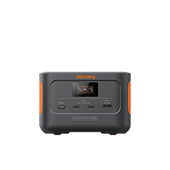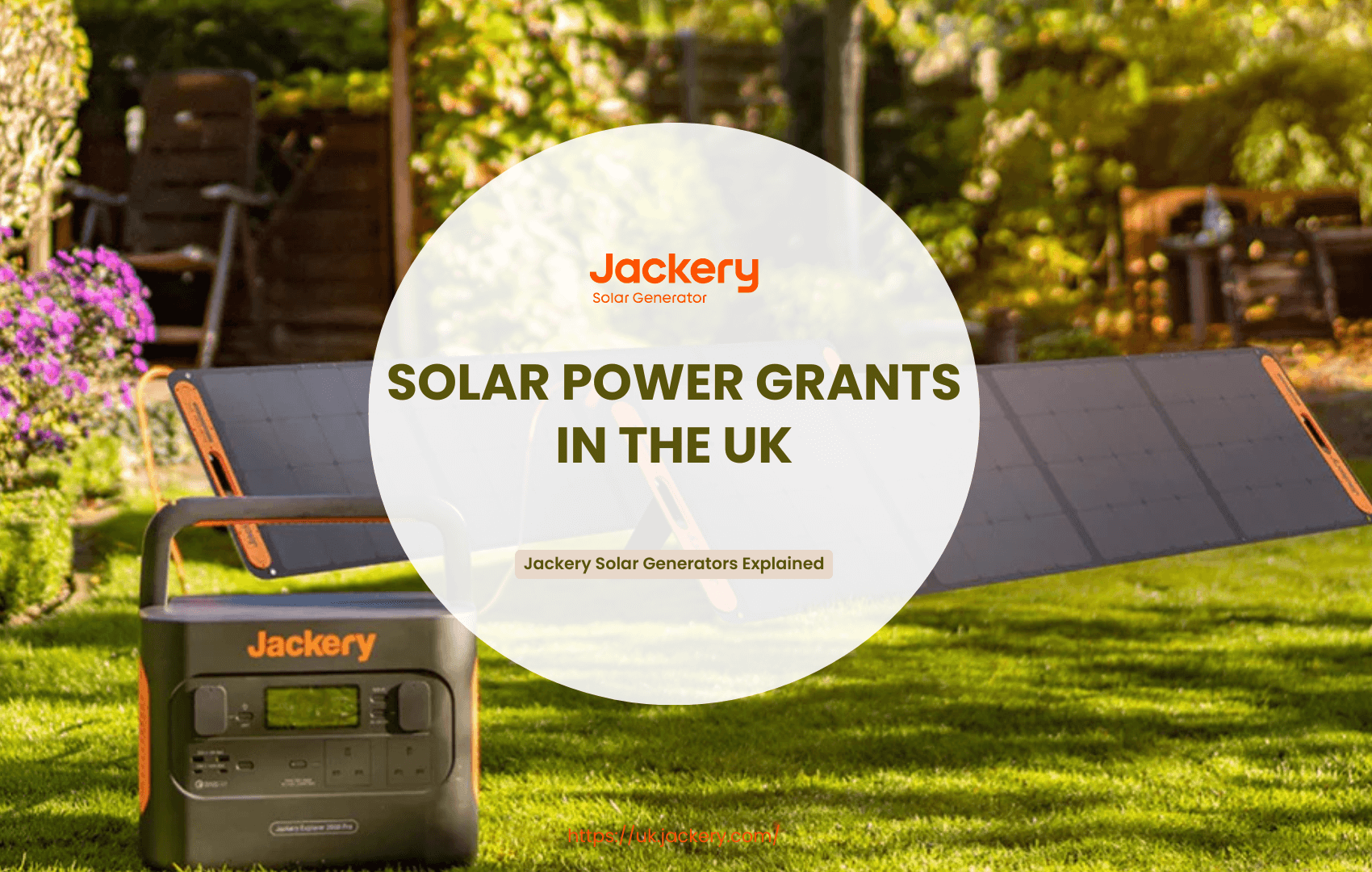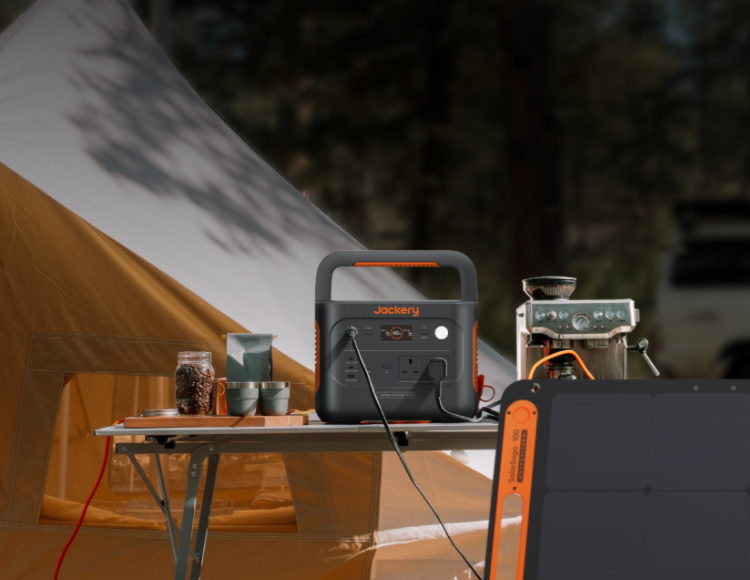Solar panels can save you 70% on your annual electricity bills, and an average three-bedroom house will pay for itself in 15.56 years. As a result, many homeowners want to switch to solar, but the upfront costs put them off.
Fortunately, various solar power grants are available to ease the financial burden and make renewable energy more accessible. However, you may need to determine which solar power grant is right for you. So, we've compiled a comprehensive guide to help you make the most of solar power grants in the UK.
Suppose you only want to try solar energy with a lower budget. In that case, we recommend a solar generator, such as Jackery Solar Generator, which combines solar panels with a portable power station to turn sunlight into electricity to charge household appliances efficiently.
|
Key Takeaways: |
|
- Solar power grants are essential in the UK from various perspectives, from economics and the environment to social policy. - The UK government offers several solar power grants to promote renewable energy development. - UK consumers must understand how to avoid falling victim to solar power grant scams. - There may be limited opportunities to get solar panels directly for free in the UK, but there are still opportunities. - We recommend Jackery Solar Generator 2000 Plus, with expandable battery packs to charge your appliances with 2 to 12 kWh capacity. |
Why Are Solar Power Grants Important in the UK?
Solar panels are a very eco-friendly way to produce free electricity for your home. However, is it worth buying solar panels in the UK? The UK government offers several grants for solar panels to promote energy-efficient upgrades, renewable energy, and carbon emissions reduction.
Solar power grants are financial incentives provided by the UK government and local authorities to encourage using renewable energy, especially solar energy. They aim to reduce the upfront costs of installing solar panels so that homeowners and businesses can switch to green energy at a more affordable price.
The importance of solar power grants in the UK is reflected in many aspects, from economics and environment to social policy. Here is a detailed analysis of why solar power grants are important in the UK:
Economic Benefits
In the UK, solar power grants can cover part of the installation cost of a solar system. In some cases, they even cover almost the entire installation cost. In addition, they indirectly help households that install solar energy save thousands of pounds in energy costs.
Encourage the Adoption of Renewable Energy
Solar power grants make solar energy an option for a broader range of people, including those with limited disposable income or a smaller household budget. In short, by providing solar power grants, the government can incentivise more households and businesses to install solar panels.
Technological Innovation
Solar power grants can encourage more companies to invest in research and development, promote innovation and improve the efficiency of solar technology.
Energy Security and Stability
Solar power grants encourage more British residents to use solar systems, enjoy a stable power supply, and enhance the UK's energy security.
Solar Power Grants in the UK
The UK government offers several solar power grants to promote energy efficiency upgrades. The eligibility criteria for solar power grants vary depending on the specific scheme. For example, to qualify, you may need to live in a particular area or type of property. Before applying for any solar grant, meet all the eligibility criteria.

1. Smart Export Guarantee (SEG)
While the Smart Export Guarantee (SEG) is not a direct government grant, all licensed suppliers must now offer export tariffs to their customers.
Criteria for obtaining Smart Export Guarantee (SEG):
- All homeowners with conventional solar panel systems (up to 5 MW capacity).
- Homes must have smart meters installed.
|
SEG Tariff Rates |
|||
|
Energy Suppliers |
Tariff (p/kWh) |
Potential Annual Savings (£) |
Customer Only |
|
Octopus Energy (Intelligent Octopus) |
29.4 |
£819.1 |
YES |
|
Octopus Energy (Flux) |
26 |
£747 |
YES |
|
Good Energy (Exclusive) |
20 |
£740 |
YES |
|
So Energy (So Bright) |
20 |
£740 |
YES |
|
OVO Energy (Exclusive) |
20 |
£740 |
YES |
|
E.ON (Next Export) |
16.5 |
£715.5 |
YES |
|
Good Energy (Solar) |
6.4 |
£705 |
NO |
|
Rebel Energy (SEG) |
6 |
£642 |
NO |
(Data Source: Green Match)
Figures in the table are based on a 4kW solar panel system for an average 2-3 bedroom home.
2. ECO4
ECO4 (Energy Company Obligation) replaces ECO3 on 1 April 2022 and will last until March 2026. The ECO4 grant covers other energy-saving improvements such as heating systems, insulation and double glazing. Through the ECO4 scheme, the government has allocated £4 billion to install solar panels and heat pumps across the UK (excluding Northern Ireland).
ECO4 allows low-income households to replace inefficient heating systems with more efficient and environmentally friendly systems, such as solar PV panels.
Who is eligible for the ECO4 grant?
The ECO4 grant is currently out of stock in Northern Ireland. You are eligible for ECO4 funding if you receive any of the following benefits:
- Earn less than £31,000.
- Have an inefficient heating system within the current DG energy efficiency band.
- Own your own home and live in it / Live in private rented accommodation (with landlord's permission).
- Receive a government benefit (such as child benefit or income support).
- Have an all-electric home (gas and natural gas hybrid) and exclude a biomass boiler or district heating network.
|
Companies Providing ECO4 in the UK |
|
|
British Gas |
Ovo Energy (including Boost and SSE) |
|
Bulb |
Scottish Power |
|
EDF Energy |
Shell Energy |
|
Eon |
So Energy |
|
Octopus Energy (including Co-Op Energy) |
Utility Warehouse |
|
Outfox the Market |
Utilita |
3. 0% VAT on Solar Panels & Batteries
From April 2022, UK households can enjoy zero VAT on materials and installation of energy-saving measures. To help households become more energy efficient, the UK government will reduce the 5% VAT exemption on energy-saving measures (e.g. solar panels, heat pumps) to 0%. However, the VAT exemption will end in March 2027, and the rate will revert to 5%.
Who is eligible for 0% VAT?
- Must include installation and products that need to be completed together.
- You can also install other goods/services at the same time (e.g. insulation), but the main work must be energy-saving materials.
4. Home Upgrade Grant (HUG2)
Local authorities administer HUG2, each setting its eligibility requirements and which home improvements are available. While the amounts awarded vary from authority to authority, the average grant approved is around £10,000.
You can use the money to make energy-efficient home improvements, such as installing solar panels. You can get solar panels for free. The specific council in your area determines the amount of funding, so contact them to find out how much you can get. However, the Home Upgrade Grant scheme is available until March 2025.
Criteria for obtaining the Home Upgrade Grant (HUG2):
- Must be a homeowner or private tenant.
- Low income (gross annual household income of £39,000 or less before housing costs and bills).
- You do not heat your home with gas, oil, coal, LPG or only electric heating.
- Have a current Energy Performance Certificate (EPC) between D and G.
If you earn over the £39,000 threshold, you can be interviewed by your local authority, who will decide if you qualify based on other factors.
5. Warm Homes Nest Scheme
The Welsh Government's Warm Homes Nest Scheme offers free advice and funding to reduce energy costs and improve comfort in homes with low-performance ratings. Eligible households can also get free solar panels through this scheme, aimed at low-income families and people living in deprived communities across Wales.
Who is eligible for the Warm Homes Nest Scheme?
- You own or rent your home privately.
- Your property is energy inefficient and has high heating bills.
- You are receiving means-tested benefits / you live in a low-income household.
- Your home has an EPC rating of E or lower.
- Your home has an EPC rating of D or lower, and you or a member of your household has a qualifying condition (chronic circulatory, respiratory or mental health condition).
6. Public Sector Decarbonisation Scheme
The Department of Energy Security and Net Zero (DESNZ) has confirmed that it will launch the fourth phase of the Public Sector Decarbonisation Scheme (PSDS).
The Public Sector Decarbonisation Scheme and its sister scheme, the Public Sector Low Carbon Skills Fund, are both part of a scheme that aims to provide renewable energy and technologies, such as solar panels, to different types of organisations, which can help acquire commercial solar panels.
The scheme aims to reduce public sector building emissions by 75% by 2037. Funding for the scheme is targeted at public sector organisations, not domestic solar panel installations. Therefore, please confirm with your local authority if this is available.
How To Avoid Solar Power Grant Scams?
More and more British households are choosing to install solar panels. However, this has also attracted some criminals who use solar subsidies to commit fraud. To protect their rights and interests, British consumers must understand how to avoid becoming victims of solar power grant fraud.
British residents considering using solar energy need to be clear about the specific content of the relevant solar power grant policies, including the standards, application process, and duration of the subsidies. The official government website and authoritative agencies are the best information sources.

In the UK, most scammers will use the following methods to commit solar power grant fraud:
- High subsidies
- Pretending to be a staff member
- Requesting upfront payment
Vigilance and careful decisions are the keys to avoiding fraud when dealing with matters related to solar power grants.
Tip 1: Verify the source of information. When receiving information about solar power grants, first verify its authenticity. You can confirm by calling the official government hotline or visiting the website.
Tip 2: Read the contract terms carefully. Before signing any contract, carefully read all the terms and conditions, especially fees, subsidies and returns.
Tip 3: Choose a regular installer. You can judge and choose a qualified and reputable solar panel installer by reviewing past cases, customer reviews and relevant certifications.
Tip 4: Don't rush into making decisions. Consumers should take their time but give themselves enough time to verify the situation and consult others.
In short, by understanding the policies, identifying fraudulent means and taking adequate preventive measures, British consumers can better enjoy the convenience and benefits of solar power grants.
Jackery Solar Generators Explained
There are many limitations to solar power grants in the UK, such as the higher initial cost despite the grant, potential roof space constraints, limited grants, roof orientation, and more. In essence, grants can assist in reducing the cost of solar panels; however, the initial investment can still be substantial, and not all residences are suitable for optimal solar panel installation due to roof design and weather.

Suppose you still want to try solar energy with a limited budget or roof spaces. In that case, we recommend the Jackery Solar Generator, which is powerful enough to charge household appliances with solar energy. If you worry about bad weather, wall outlets or carports can recharge the Portable Power Station. Moreover, it is safe to use this generator at home since it has a battery management system and protection technology. We will introduce Jackery Solar Generator 2000 Plus, the expandable portable power solution for home use or outdoor activities.
Jackery Solar Generator 2000 Plus
Jackery Solar Generator 2000 Plus is ideal for home backup, off-grid living, or professional work. It is a solid portable power solution that delivers outstanding performance. With its impressive capacity and powerful output, this device can support the operation of essential appliances for weeks, even certain large appliances, such as your refrigerator, computer, AC, etc., in your home or outdoors.
The Jackery Explorer 2000 Plus enables the addition of extra battery packs, increasing the capacity from 2 kWh to an impressive 12 kWh, thereby significantly satisfying your power needs. This solar product has a remarkable output of 3000W, providing a 30% higher rated power than other 2 kWh solar products. Almost all essential appliances are powered.
ChargeShield is Jackery's advanced fast charge technology, featuring 62 protective mechanisms, 12 protective algorithms, and four types of physical safety protection. This technology uses a unique stepped variable-speed charging algorithm to enhance safety and extend battery pack lifespan by 50%.
The Solar Generator 2000 Plus stands out as a groundbreaking add-on battery pack that offers the convenience of recharging through solar panels. This feature increases versatility, boosts charging efficiency, and shortens charging time. Also, it can be taken indoors safely compared to other traditional generators.
Control and supervise your 2000 Plus with the Jackery App. It accommodates various devices, facilitates real-time status monitoring, and offers customisation options and additional features.

*Review from Our User:
I have been using Jackery batteries for a long time. I felt great excitement upon the release of the Explorer 2000 Plus, which marks the inaugural release of an expendable battery system by Jackery. The system supports a capacity of up to 12kWh with a 3000W 120V output or 24kWh with a 6000W 240V output—an ideal enhancement for my home backup system.
|
Jackery Solar Generator 2000 Plus Working Hours |
|
|
Refrigerator (700W) |
2.5-14.6H |
|
Coffee Maker (550W) |
3.2-18.5H |
|
Stove (750W) |
2.3-13.6H |
|
Projector (300W) |
5.8-34H |
|
Kettle (800W) |
2.2-12.8H |
Can I Get Solar Panels For Free in the UK?
The UK government and other local bodies have set up schemes and provided solar power grants to help eligible households subsidise the installation of solar systems. However, many UK residents still want to know whether they can get solar panels for free.
The UK government has launched subsidy schemes, such as the "Solar Homes Scheme" and the "Green New Deal", to encourage households and businesses to install solar panels. For example, the Free Solar Panel Scheme is a UK government initiative to help homeowners install solar panels worth 5,000 to 11,000 pounds on their properties for free. The scheme was implemented from 2010 to 2019 for homeowners with certain conditions, such as a south-facing roof.
However, free solar panel schemes may vary due to time and policy changes. As of 2021, there are no longer any government grants or schemes in the UK that provide entirely free solar panels. Therefore, if you have further questions about the free solar panel installation program or want to know if you are eligible to apply, you can consult your local government or relevant energy company.

Ways to Get Solar Panels for Free in the UK
While there are no specific free solar panel schemes in the UK, there are some opportunities to get free solar panels. Here are some situations and ways in which it might be possible to get solar panels for free in the UK:
ECO4 Scheme: Available until March 2026.
Public Sector Decarbonisation Scheme: Available until 2026.
Warm Homes Nesting Scheme: Available indefinitely.
Local Councils and Community Schemes
Some local councils and community organisations in the UK may offer subsidies or free installation services for solar panels. Check with your local government or community organisation to find out.
Charities and Environmental Organisations
Some charities and environmental organisations in the UK may provide free solar panels for low-income families or ecological projects. You can contact these organisations to find out if they have any relevant assistance programs.
In short, although there may be limited situations where you can get solar panels directly for free, through government subsidies, local schemes and the help of charities, you may find a way to reduce or completely offset the cost of solar panels.
Solar Power Grants in The UK FAQs
The following are the frequently asked questions about solar power grants in the UK:
- Can you get grants for solar panels in the UK?
The UK government has recently introduced a series of solar power grants to promote renewable energy use. You can get solar power grants if you install a solar photovoltaic system on your home or commercial building.
However, in the UK, the eligibility criteria for solar power grants vary depending on the specific program. For example, you may need to live in a particular area or type of property. Therefore, all eligibility criteria must be met before applying for solar power grants. Please visit the relevant energy agency's website for detailed conditions and eligibility requirements.
- How do I qualify for free solar panels in the UK?
It is possible to get free solar panels, but certain conditions must be met.
If you are a low-income household that uses electric heating and a vulnerable householder receives an eligible benefit, you may qualify for free solar panels in the UK through the government's ECO4 scheme.
If you are a low-income, energy-inefficient household not connected to the gas grid, you may qualify for a discounted solar panel through the Home Upgrade Grant. Energy-inefficient households in Wales, both low-income families and those receiving means-tested benefits, are eligible for the Welsh Government's Warm Homes scheme and may get free solar panels.
- Can people on Pip get free solar panels?
Generally, Personal Independence Payment (PIP) recipients do not receive free solar panels. However, you can save some of your PIP money each month to eventually afford solar panels.
Final Thoughts
Rising electricity bills have long been a problem for homeowners and tenants in the UK. Although the electricity price cap is slowly being reduced, electricity bills are still much higher than before. The primary purpose of solar power grants is to reduce the upfront costs of installing solar panels so that homeowners and businesses can switch to green energy at a more affordable price. Solar power grants can help the UK government continue to show its commitment to reducing carbon emissions and improving energy efficiency.


























































